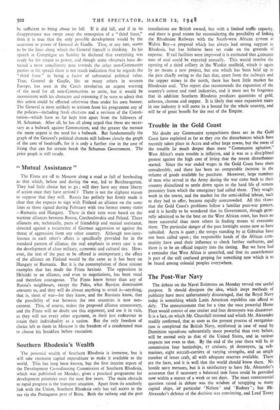" Mutual Assistance "
The Finns are off to Moscow along a road as full of foreboding as that which, before and during the war, led to Berchtesgarten. They had little choice but to go ; will they have any more liberty of action once they have arrived ? There is not the slightest reason to suppose that they will. Russia has politely but firmly made it clear that she expects to sign with Finland an alliance on the same lines as those signed during February with two former enemy states —Rumania and Hungary. These in their turn were based on the wartime alliances between Russia, Czechoslovakia and Poland. These alliances are, technically, pacts of friendship and mutual assistance, directed against a recurrence of German aggression or against the threat of aggression from any other country. Although non-inter- ference in each other's affairs is specifically provided for in the standard pattern of alliance, the real emphasis in every case is on the development of close military, economic and cultural ties. How- ever, the text of the pact to be offered is unimportant ; the effect of the alliance on Finland would be the same as it has been on Hungary or Rumania. But it is the contemplation of these sinister examples that has made the Finns hesitate. The opposition in Helsinki to an alliance, and even to negotiations, has been vocal and therefore courageous. The Finns know better than any of Russia's neighbours, except the Poles, what Russian domination amounts to, and they will do almost anything to avoid it—anything, that is, short of war—for they know, and the Russians know, that the possibility • of war between the two countries is now non- existent. This, of course, makes the proposed alliance unnecessary, and the Finns will no doubt use this argument, and use it in vain, as they will use every other argument, in their just endeavour to retain their individuality as a nation. But the only freedom of choice left to them in Moscow is the freedom of a condemned man to choose his breakfast before execution.


































 Previous page
Previous page